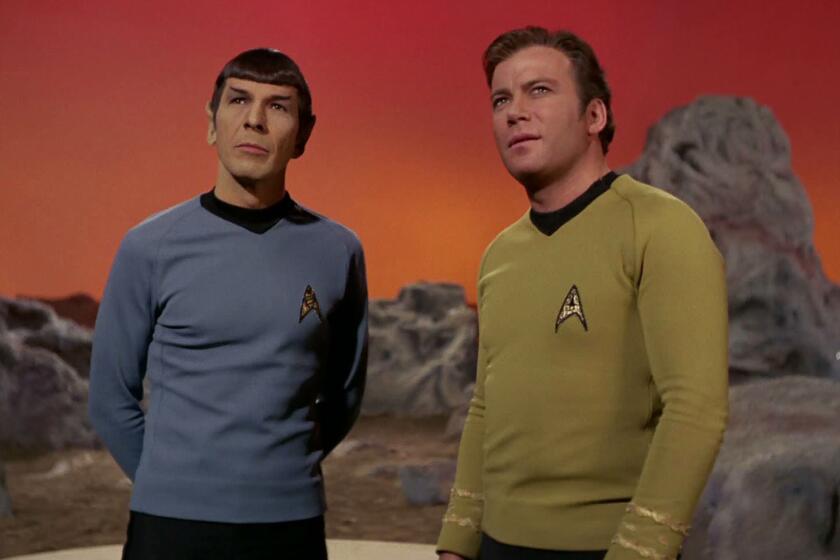World Is Small So Far for Disney Software : Computers: But the company with just 46 employees is well positioned to share in $5-billion-a-year home video game market.
Tucked away in nondescript offices in a Burbank high-rise is the headquarters of a Walt Disney Co. operation that has received scant attention: Walt Disney Computer Software Inc.
The company, which licenses Disney titles to video game publishers and itself publishes computer games, is barely 5 years old.
With 46 employees, Disney Software is just a flyspeck compared to the media concern’s famous movie-making and theme park businesses.
But the company has positioned itself to share in continued growth in the $5-billion-a-year home video game market and even faster growth of entertainment and educational computer software sales, which reached $500 million at the retail level last year.
Disney Software is also poised to benefit from what some believe will be revolutionary changes in home entertainment--a prospect that is driving an almost frenzied level of deal-making recently among Hollywood, high-technology and telecommunications companies.
However, while rival media concerns such as Time Warner Inc., Matsushita Electric Industrial Co.’s MCA Inc. and Sony Corp. chase opportunities in home entertainment technology and hardware--such as the emerging interactive CD-ROM format--Disney has quietly sat back.
“We see ourselves as a very product-oriented company, very much a creative company,” said Steve McBeth, executive vice president of Disney Consumer Products, the division that includes Disney Software. “Rather than investing in new technologies, we want to make our investments in product development.”
Analyst Jeffrey Logsdon at Seidler Amdec Securities Inc. in Los Angeles said Disney can benefit handsomely no matter what the home entertainment system of the future turns out to be. “Let the other guys go out and spend the money, have the learning curve and make the mistakes. Whatever the format is, they’ll still come back to Disney for the software.”
But some industry observers say they’re disappointed by Disney Software’s products so far.
“I think creatively they’ve been a failure,” said Peter Spear, author of several books in the field. “There’s a lot of ho-hum stuff out there, but from Disney you’d expect better.”
Jeff Silverstein, editor and publisher of the newsletter Software Industry Bulletin, said Disney has been slow to use the vast resources available throughout the company--including its characters, movie titles and technical expertise--to create blockbuster computer and video games.
“It really takes the right combination of aggressive people who have some sort of vision and it takes a corporate commitment as well,” he said. “Maybe one or both of those things are lacking over at Disney.”
Said Peter Scisco, editor of Kids & Computers magazine: “I guess we were guilty of inflated expectations.”
Disney executives toss aside suggestions that the software division has been anything less than successful. Indeed, even its harshest critics acknowledge that Disney has produced some good products, including educational children’s titles such as “Mickey’s 123’s.” Disney’s Stunt Island, a computer game released last fall that combines a flight simulator with the ability to create motion-picture-like special effects, was named the best consumer program of 1992 by the industry trade group Software Publishers Assn.
And while Disney Software is puny compared to industry giants such as Electronic Arts, Disney is well ahead of its rival studios in producing its own software. Among entertainment companies, only George Lucas’ highly regarded LucasArts Games is believed to have sold more computer games.
Negative appraisals of Disney Software products aside, the unit could also very well be profitable, although Disney doesn’t break out its financial results. It has 25 current computer titles, and an equal number of video games have been released over the years. Three computer titles--”Who Framed Roger Rabbit?,” “Mickey’s Runaway Zoo” and “Donald’s Alphabet Chase”--have sold more than 100,000 copies, the industry equivalent of earning a Gold Record.
“I think we’ve been very successful,” McBeth said.
Yet the perception that the company hasn’t performed up to expectations has fueled continued talk in the industry that Disney Software would be sold.
About a year ago, giant software developer Microsoft Corp. was widely thought to be close to a deal but walked away.
Disney officials emphatically state that the software unit was never on the block.
Susan Boeschen, vice president of Microsoft’s consumer division, said: “We have had ongoing conversations with Disney,” but she would not elaborate.
McBeth says Disney is as committed as ever to the software business--so much so that Disney Studios Chairman Jeffrey Katzenberg is making a major address at the Consumer Electronics Show in Chicago next week. Also at the show, Disney will preview its “Aladdin” video game, based on its hit animated movie.
Disney has high hopes for the Aladdin video, which it’s co-producing with Virgin Games; it is being published by Sega of America Inc. The game, due in the fall, marks a new level of Disney involvement in the development of video games--it even enlisted the talents of its famed motion picture animators--and company executives predict it will set new standards in video game quality and resolution.
Although some observers say “Aladdin” could generate some long-hoped-for excitement, others are skeptical. At last year’s Consumer Electronics Show, “I sat in a room and got the same line” from Disney, Spear said. “Two years ago, it was ‘Rocketeer,’ ” which Spear said received little notice because the film flopped.
Some observers also complain that Disney doesn’t release its movie-themed software until public interest in the films has faded. By contrast, Sony’s games division has been collaborating with makers of Sony Pictures’ “The Last Action Hero,” a movie starring Arnold Schwarzenegger that is expected to be one of this summer’s big hits. The game, said to be incorporating some of the high-tech wizardry of the film, will be released six months after the movie.
For another game based on last year’s “Bram Stoker’s Dracula,” director Francis Ford Coppola reportedly supplied designs of characters, sets and storyboards to Sony game makers so a CD-ROM video game could be released shortly after the movie.
“From the software side, the ability to work with a sister company on ‘Bram Stoker’s Dracula,’ ‘The Last Action Hero,’ ‘Cliffhanger’--that’s fantastic,” said Peter Dille, director of marketing for Sony Electronic Publishing. “I think we are kind of uniquely positioned.”
Sony and other big media concerns have also been placing their bets on technological innovations that could shape the future of home entertainment. On Sunday, for instance, Sony Electronic Publishing said it acquired Psygnosis Ltd., a leading British maker of video and CD-ROM products. Sony is also working with Nintendo Ltd. to develop technology that could usher in the next generation of video games.
Matsushita and Time Warner, meanwhile, have invested in 3DO Co., a hot start-up company that will license software for a new interactive “multi-player” that will hook up to television sets.
Also, earlier this month, regional phone company U S West Inc. agreed to pay $2.5 billion to buy more than 25% of Time Warner’s movie-studio and cable-television assets, an alliance that could bring interactive television to cable subscribers.
As for Disney, McBeth said CD technologies are being “looked at,” but no specific products have been announced. He cautioned that “anybody looking at the future of interactive entertainment has to be aware there’s a lot of hype out there in terms of what’s coming.”
Johnny Wilson, editor of Computer Gaming World magazine, noted Disney’s longtime pattern of conservatism when it comes to new businesses. “Rather than pioneering, they’re a solid player in a second tier, then they use their properties to leverage into the first tier.”
And that course seems to suit Disney just fine when it comes to software. Said McBeth: “We’ve been on a steady, progressive growth cycle. If people are expecting a major shift in strategy at Disney, we’re not shifting strategy. We’re just continuing to grow and develop what we’re already doing.”




